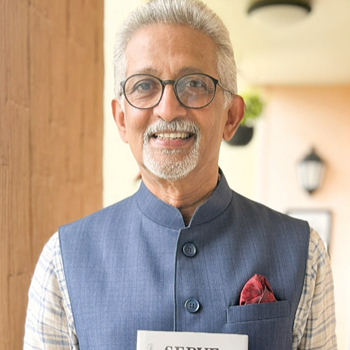Retail Icon

Building a store—you build a culture and a future
A name synonymous with the evolution of Indian retail, B.S. Nagesh, former MD of Shoppers Stop, is a pioneer who helped shape the industry despite having no formal background in it—Nagesh's journey is a masterclass in vision, resilience and reinvention. In the course of a detailed discussion, he sheds light on an illustrious career in retail, the challenges and opportunities before modern-day retail, and looks back on a behemoth that has redefined the face and paradigms of retail shopping.
In his next innings with the Trust for Retailers and Retail Associates of India (TRRAIN), a public charitable trust founded by him in 2011, he champions the cause of retail employees, bringing dignity and pride to the frontline.
At a book discussion organised by Upohan Management Consultants, Pune, Nagesh in conversation with Advait Kurlekar, CEO, Upohan, on his book “SERVE”, lets us in on the secrets of brand building, establishing a common culture across stores and actively giving back to the community
"When you lead with the heart, profits will follow. Maybe not always right away. But, when you play the long game, integrity wins"
— B.S. Nagesh
On his watch, India witnessed a never-before shopping revolution. When the Raheja Group-backed Shoppers Stop opened way back in 1991, most Indians would have looked astonished at the notion of a “departmental store”. Or, the very idea of shopping being a pleasurable, leisurely experience with multiple brands and segments jostling for space under a roof.
The baggage scans and parking scans, the central air-conditioning and the pleasant service of a ‘customer care associate’ who went the distance in getting you what you wanted, were all frankly unknown turf. But, Nagesh and his team managed to set up the flagship store in less than 90 days—changing the way India shopped forever.
Bold, early decisions such as investing Rs.12 crores in Enterprise Resource Planning before hitting Rs.50 crores turnover or fostering a culture where management trainees started off cleaning toilets and doing housekeeping before being allowed near the customers, went the distance in the brand’s success.
And yet, he insists, he had no idea what he was doing and simply learned on the job.
A Master’s degree in ignorance
“I was one of the most ignorant General Managers and CEOs in the industry to start with. I had no background in retail and apparel fashion. But, ignorance can be bliss. When you don’t know and have the ability and the decency to ask deep questions, you will learn. Every bit of customer learning, I picked up on the go. I would spend more time standing outside the store than inside it, asking questions. Customers are the lifeline of every single business; they must be front and centre of what you do. Plus, retail is quite unique. You are actually sitting in the community—so if you don’t give back to the community, you have no right to remain.”
Hats off to the late Mr. Raheja who put his faith in a young man of 30 something, handing over Mumbai’s most expensive properties to run.
"I have always been a risk taker. I always say that there’s no harm in asking or trying out something new (Maangne mein kya harj hai). But, if you don’t even ask the question, the answer will always be no"
On what it meant to be a pioneer with no legacy to fall back on

“Since none of us came from a retail backdrop, there was plenty of trial and error, and opportunity for growth. For instance, we did business just six days a week, but paid for seven days—that was a huge loss and a learning curve for the entire industry. A lot of first practices in retail were put in place with great struggle. I have always been a risk taker. I always say that there’s no harm in asking or trying out something new (Maangne mein kya harj hai). But, if you don’t even ask the question, the answer will always be no.
How he arrived at the figure of 50,000 sq.ft. of a department store space
“There was no actual science behind it,” he laughs. “It’s the Indian mentality, truthfully speaking, a gift of the ancient Indian mathematician Aryabhata. He gave us the concept of zero, and ever since, us Indians have developed this lovely habit of adding zero to everything. Ask someone who runs a Rs.100 million company what his next goal is, and he will scale he wishes to make it a Rs.100 billion company—without realising that’s a huge leap.
For a 30-year-old like me who was running a 500 sq.ft. store, where was the fun in saying that I wanted a 5,000 sq.ft. store next—50,000 sq.ft. sounded far more impressive. What I didn’t realise was that the area exceeds an acre—imagine running that kind of a space.”
Brand is not how you name it, but how you treat it
As the story goes, it wasn’t focus groups and intense research that had come up with the name Shoppers Stop. Instead, as Nagesh and Mr Raheja ruminated over coming up with a simple, impactful name, Mrs. Raheja, who was then in Boston, pointed out over the phone that there was a store behind her called 'Stop n Shop'.
Without losing a beat, Nagesh picked up a cue and came up with Shoppers Stop. Now, this did not best please their creative agency tasked with the branding, but Nagesh pointed out a fundamental truth. “A brand is not how you name it, but how you treat it. It is always the outcome of a relationship, with your staff and your customers, and not an input,” he says.
From building a sense of ownership and pride in the team to incentivising daily targets with ice-cream treats, to making sure each youngster learnt the nuts and bolts of the business, from treating everyone equally, whether a liftman and security, to explaining them the finer nuances of the job, building a culture of customer-centricity at Shoppers Stop was a task as deep as it was long-winded, but Nagesh kept going on.
"Customers are the lifeline of every single business; they must be front and centre of what you do. Plus, retail is quite unique. You are actually sitting in the community—so if you don’t give back to the community, you have no right to remain"
Customers owning the brand

There was pride in wearing a Shoppers Stop uniform, and pride in living up to it—an instance best illustrated by an agitated customer calling up Nagesh pointing out that he needed to come to Andheri station immediately and stop his staff from fighting in public. “I responded that they were off duty, so I had nothing to do with their fight,” says Nagesh. To which, the customer retorted, “Oh, but you do. For they are fighting in your uniform.”
“This was a fine example of a customer taking ownership of the brand,” said Nagesh. And, this relationship with their customers was exactly what got them out of a tight spot. “As it happened, sales hadn’t been great in a year. My team was all set to forego their monthly salary, because as they pointed out - if they didn’t take salaries home for the month of March, they would turn profitable. “I asked them to hold on. I sent emails to my customers with Rs 100 gift vouchers each—no conditions set. There was this fear that this could lead to a greater loss, but I had faith.
The customers lived up to his faith. “We had 13 per cent conversion rate at an average of Rs.1100. It was 1996. We made a net profit of Rs 1 lakh. Everyone took home their salaries,” he says. “Now, this was no genius at a play, but a sincere belief that your customers are a part of your brand. This compassionate attachment is but natural. It isn’t part of any paid service.” he added.
TRRAIN
Founded by B.S. Nagesh in 2011, the Trust for Retailers and Retail Associates of India (TRRAIN) is a pioneering non-profit organisation focused on uplifting the lives of frontline retail employees. With initiatives like TRRAINHer (empowering women in retail), TRRAIN Youth Empowerment Programme (TYEP) for skilling underprivileged youth, and Retail Employees Day (celebrated on 12 December), TRRAIN has touched over 1.2 million lives. Its mission is simple yet powerful: bring dignity, pride and formal recognition, to the unsung heroes of Indian retail—those who serve on the shop floor every day.
The Value Book
This book played a pivotal and unique role in shaping the brand’s identity and internal culture. It wasn’t just a set of corporate principles; it was a living document that embedded the soul of the company into its daily operations and people practices. “But, values are not just what you write on a board. Values play out in their manifestation. Thus, in our annual appraisals, the employees had to state which were the values that they had followed that year, and the values that they had seen others following,” shared Nagesh.
At a time when formal HR practices were rare in Indian retail, the Value Book created a shared language and standard for behaviour. It detailed not just the “what” of operations, but the “how” and “why”, grounding all actions in respect, integrity, and customer-centricity.
“If values are in place, everything else - performance, growth, profitability, will follow,” Nagesh said. “But, that very first value of trust came from the Rahejas, who gave me the freedom I needed. It is why the business has gone from strength to strength. Listening, trusting, giving them an opportunity to fail and grow, all of this contributes to the success of business.
The belief that only if you own shares can you be an owner, is not accurate. Not all shareholders are owners. Having said that we created the first Employee Stock Ownership Plans (ESOPS) in the industry,” he smiled. ESOPs are company-offered schemes that give employees ownership in the form of shares, aligning their interests with the company’s growth and success.
“From not knowing what an ESOP was to issuing it finally, we went public in 2005. A lot of our leadership, including me, made some decent money,” said Nagesh.
Building common culture
It wasn’t easy transposing the culture from the flagship store in Mumbai to their other stores, especially not in the pre-internet, pre-mobile days of 1994. “It was critical to build a team and a leadership that was in sync with the culture at the Andheri store,” says Nagesh. To that end, when they recruited staff for their store in Bengaluru, they were taken to Mumbai. “There they worked with our team for a month or two, learning the ropes from the original staff, watching the Shoppers Stop way of doing things.” he added.
This was a huge expense, having double the staff, but Nagesh says it was well worth it. “They had buddies who could teach them stuff that could never come out of a training manual. This is the only way we can have a common culture across stores.
RETAIL INDUSTRY AT A GLANCE
The retail industry in India is a powerhouse, contributing over 10% to the country’s GDP and employing around 8% of the workforce, making it the second-largest employer after agriculture. Valued at over $900 billion, it’s projected to reach $1.4 trillion by 2026, driven by rising incomes, urbanisation, and digital adoption. Organised retail, still under 15% of the total market, is rapidly expanding, creating vast opportunities for innovation and employment. From kirana stores to high-end malls and e-commerce giants, retail in India is a growing economic engine.
Failures are part of the game
“In my book, SERVE, there’s an entire chapter on failures. In fact, I should have been sacked at least five times,” he quipped. “But, the Raheja family kept its faith.”
One early setback was the dismal performance of Shoppers Stop's first loyalty programme, which failed to resonate with customers.
But today, the First Citizen programme, with over 10 million members is one of Shoppers Stop’s most enduring success stories and a benchmark in Indian retail loyalty initiatives. Despite the modest start, it has since grown into a robust customer engagement platform, contributing significantly to the brand’s revenue—a sterling case study in Indian retail loyalty.
On the opportunity before modern retail
“Do something for senior citizens. The amount of wealth sitting with 50 plus folks is very high but other than the airports where they give you a buggy if they see you with silver hair, everywhere else, including coffee shops, they are the last to be attended. Their children have done well, they have homes and strong finances. But, where is the attention to them?” says Nagesh.
"A brand is not how you name it, but how you treat it. It is always the outcome of a relationship, with your staff and your customers, and not an input"
On passing on the baton

“Leaders and managers often tend to think they are indispensable. But, I exhausted my leave every single year. In fact, each time I went on leave, the sales went up,” he laughs. “So, if you think you are the be all and end all, you are wrong.”
“But, as a leader, when it comes to looking at GenNext, you do not want clones of yourself, but someone who will ultimately align with and build on what you have put in place. And, our purpose was very simple: Can we build confidence in our customers when they wear our clothes?
Today, I can say with pride that 99.9 per cent of our staff who have left, continue to be our brand ambassadors.”
In keeping with his father’s life plan of “Learn 25 years, earn 25 years and return 25 years,” Nagesh announced his plans of retiring by 50. In 2011, he set up TRRAIN a livelihood programme for retail.
On how AI will alter paradigms in the days to come
“AI will bring tremendous changes to the way you operate business, but not in the execution of it. If I am the person serving you, AI will make me more efficient, but at the end of the day, you will still want me to serve you. So, technology is a value-addition but never the whole story. For example, after Covid pandemic, with all sales happening online, physical businesses thought it was their end. Boom! They have all come back, especially brick-and-mortar retail. There is no replacement for the human touch.
Book Review: All I wanted was to SERVE
SERVE: Business from the Heart – The Shoppers Stop Way by B.S. Nagesh, co-authored with Ritu D. Ferrao, is a book that is many things at once: part memoir, part leadership manual and part manifesto. Either way, when it comes from the first GM of Shoppers Stop Andheri, India’s first ever department store that heralded retail in its modern avatar, it’s worth a read.
Peppered with anecdotes showcasing the creativity that went into making a brand like Shoppers’ Stop to making the shift from a ‘sellers first’, to a customer-centric approach, Nagesh’s book is not just about building a business but also about people, purpose, and a legacy. In his words: “When you lead with the heart, profits will follow. Maybe not always right away. But when you play the long game, integrity wins.”
A personal journey with a public purpose
The book grabs your attention at the get-go because Nagesh’s journey from someone with hardly any background in retail to being backed by the Raheja family, to head their flagship store in Andheri and learning on the job, is the quintessential aspirational story. It’s resonant and relatable, besides being written with simplicity and authenticity. Far from being jubilant at a career arc that few achieve, Nagesh is writing to inspire and instruct. “All I wanted was to serve,” he says in the book. But, in the early days, his notion of service was to join the army. At the last minute though, his mother’s plea forced him to rethink his plan, and clearly this alumnus of Banaras Hindu University, was destined to walk a path that would change the very face of Indian retail.
-
Title: SERVE: Business from the Heart – The Shoppers Stop Way
-
Available on: Amazon
-
Price:599
-
Publisher:Crossword
How things were back then

Just consider the backdrop—for uncountable years, most Indians shopped at standalone stores, until 1991 when Shoppers Stop made its debut. It introduced modern retail and changed the experience of shopping forever. Shoppers Stop introduced the concept of experiential shopping by converting vendors into partners and competitors into collaborators. But, this is more than just the story of retail revolution. It’s a fascinating tale of how the spirit of service encompassed a store, a brand and a company, and evolved into building communities in the retail space and in the world of service. SERVE tells of how a business run from the heart doesn’t just result in huge revenues, it creates unforgettable memories, making that business a forever-brand to reckon with. A compelling narrative of the Indian retail revolution.
That spirit of service underpins every story in the book, from managing frontline retail associates to steering corporate strategy. It’s no surprise, then, that Nagesh chose the word 'SERVE' as both the title and the heart of his narrative. Whether he’s talking about mentoring team members, listening to customers or shaping company culture, his message is consistent: A brand is not how you name it, it is how you build it.
And, the anecdotes show us just how—from ensuring dignity of service by deeming all employees ‘customer service associates’ to incentivising daily targets with ice cream treats to attracting customers to their new store with photo albums carried by enthusiastic employees to various housing colonies, all the better to bring in the crowds, to learning hard lessons, there’s something in the book for everyone. It helps that Nagesh is candid about his failures and decisions that did not work out.
Retail, reinvented
What’s especially refreshing is how SERVE avoids the usual jargon of management theory and instead grounds its lessons in lived experience. Nagesh doesn’t hide behind metrics or abstractions. He talks about the people behind the numbers, the store associates, the loyal customers, the Raheja family who let an inexperienced young man run the most expensive space in Mumbai.
Some moments from the book are particularly unforgettable: Like the opening day in 1991. With just an hour to go for the launch, there were stacks and stacks of clothes on the shop floor (in containers) because the vans carrying the furniture and fittings were stuck in Mumbai traffic. Ingeniously and hilariously, Nagesh simply asked the pundits to prolong the pooja so the team could get its act together.
The writing is clean, crisp and conversational. The pacing never lags, and the voice remains consistent throughout.
Beyond business: A larger mission
In recent years, Nagesh has turned his attention to social entrepreneurship through TRRAIN, an organisation focused on improving the lives of India’s vast, but often overlooked retail workforce. SERVE subtly weaves this transition into its final chapters, underscoring the idea that true leadership extends beyond boardrooms and balance sheets.
He writes, “The retail associate who greets you every day, folds your clothes, and handles your returns—they’re the real face of the brand. And, yet they’re the least seen. That needs to change."
In short, the book doesn’t just tell us how retail evolved in India—it urges us to rethink how we treat those who make it work.
Nagesh’s philosophy of 'heart-led leadership' offers a counter-narrative to the winner-takes-all mentality that dominates so much of today’s business thinking.
In an increasingly impersonal business world, the book is a powerful reminder that great companies are built not just by smart strategies, but by deep purpose and genuine care. It’s a book with soul, and one that proves that in serving others, we ultimately serve ourselves.